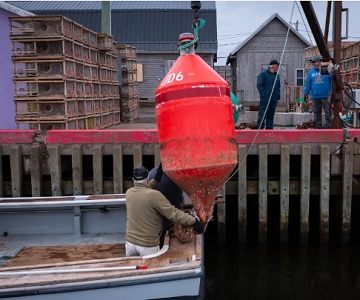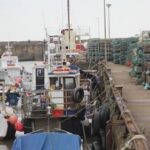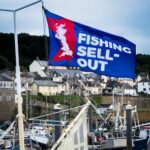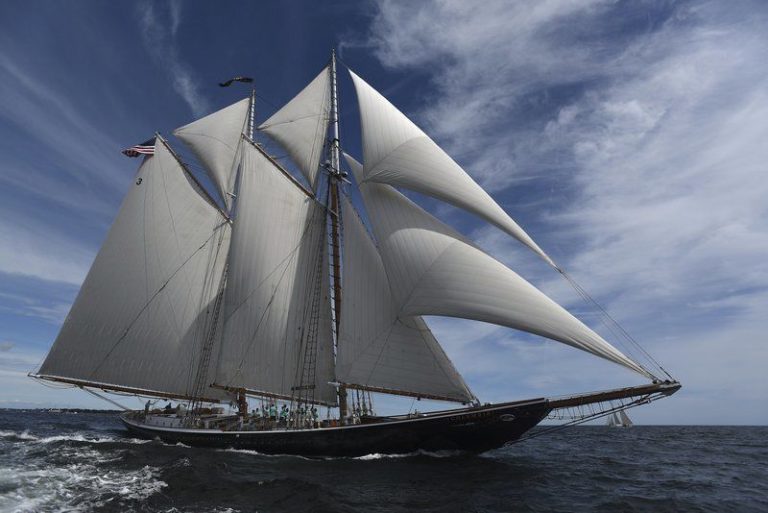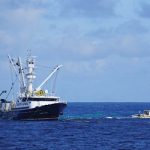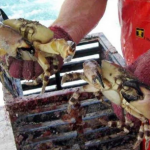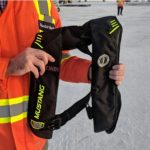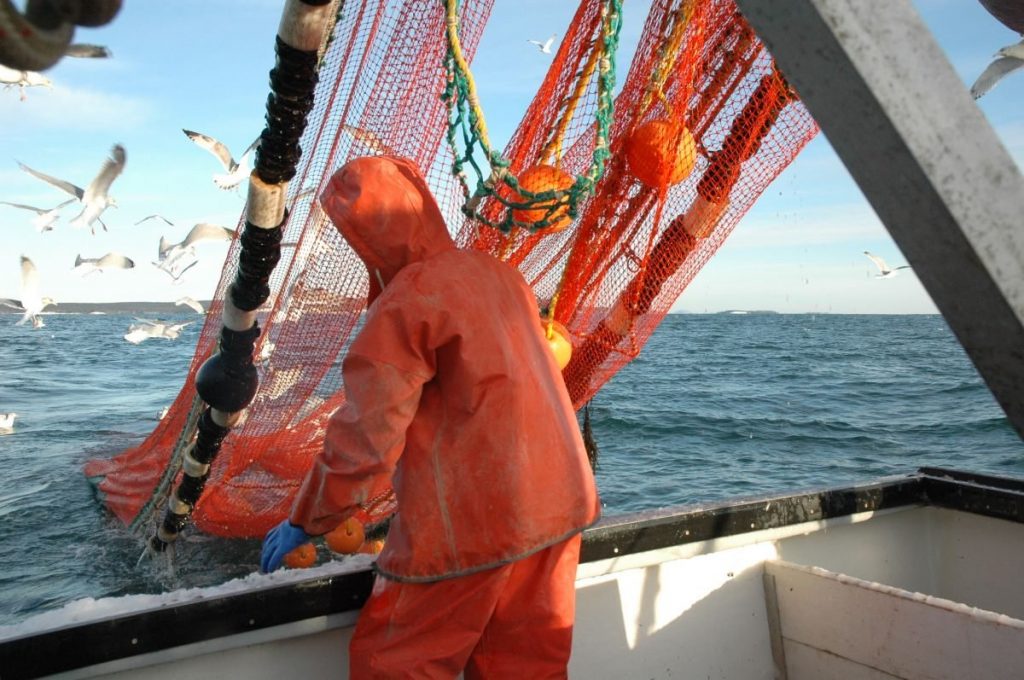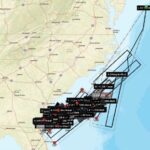Tag Archives: Fisheries and Oceans Canada
Continuation of lobster quality and moult survey very important to southwestern NS industry
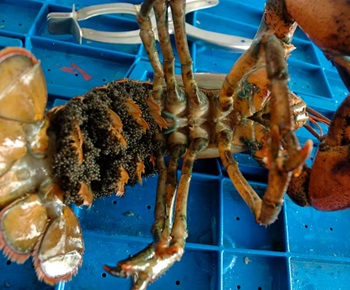 Every fall since 2005, in advance of the commercial lobster fishery opening in Lobster Fishing Areas (LFA) 33 and 34, a scientific survey has been conducted in the waters around southwestern Nova Scotia. “The overall objective of the Atlantic Lobster Moult and Quality (ALMQ) Survey is to develop an ongoing monitoring program, based on biological indicators of moult-timing, quality and environmental conditions, to predict the quality of lobsters at the start of the lobster seasons in LFAs 33 and 34,” says Heather Mulock, executive director of the Coldwater Lobster Association. “The data collected is used to establish a framework for adaptation decision-making for the lobster sector, including ensuring better product marketability, live storage, and international shipping valuation.” more, >>CLICK TO READ<< 07:10
Every fall since 2005, in advance of the commercial lobster fishery opening in Lobster Fishing Areas (LFA) 33 and 34, a scientific survey has been conducted in the waters around southwestern Nova Scotia. “The overall objective of the Atlantic Lobster Moult and Quality (ALMQ) Survey is to develop an ongoing monitoring program, based on biological indicators of moult-timing, quality and environmental conditions, to predict the quality of lobsters at the start of the lobster seasons in LFAs 33 and 34,” says Heather Mulock, executive director of the Coldwater Lobster Association. “The data collected is used to establish a framework for adaptation decision-making for the lobster sector, including ensuring better product marketability, live storage, and international shipping valuation.” more, >>CLICK TO READ<< 07:10
DFO Standing Committee Tables Report on Illegal, Unreported and Unregulated Fishing
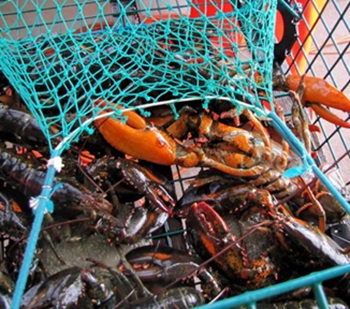 The Standing Committee on Fisheries and Oceans has made 32 recommendations to the federal government in its report, Reducing the Harms Caused to Canadian Fish Stocks by Illegal, Unreported and Unregulated (IUU) Fishing, tabled in the House of Commons on Oct. 3. “During its study, the Committee identified gaps that need to be addressed by DFO in order for DFO to have a fully informed response to IUU fishing. For example, more needs to be done to determine how much IUU fishing is taking place, intelligence-gathering and sharing needs to be improved and enforcement actions in relation to IUU fishing need to be strengthened, including in relation to the role of organized crime,” concluded the report. more, >>CLICK TO READ<< 08:12
The Standing Committee on Fisheries and Oceans has made 32 recommendations to the federal government in its report, Reducing the Harms Caused to Canadian Fish Stocks by Illegal, Unreported and Unregulated (IUU) Fishing, tabled in the House of Commons on Oct. 3. “During its study, the Committee identified gaps that need to be addressed by DFO in order for DFO to have a fully informed response to IUU fishing. For example, more needs to be done to determine how much IUU fishing is taking place, intelligence-gathering and sharing needs to be improved and enforcement actions in relation to IUU fishing need to be strengthened, including in relation to the role of organized crime,” concluded the report. more, >>CLICK TO READ<< 08:12
N.S. fisheries minister renews call to his federal counterpart for help on illegal fishing
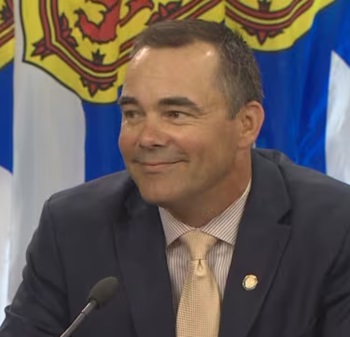 Nova Scotia’s fisheries and aquaculture minister says his federal counterpart’s silence in response to calls for action against illegal fishing in the province’s southwestern region sends a message to the industry and communities affected that she does not care. Kent Smith wrote to federal Fisheries Minister Diane Lebouthillier on Wednesday after receiving no response to a previous letter last month that raised concerns about illegal lobster fishing in the Clare region and public safety concerns tied to that activity. I’m feeling as though there’s not enough priority put on this file from her and her senior leadership,” Smith said in an interview at Province House. Although some First Nations fishers are practising a legal and treaty-recognized food, social and ceremonial fishery in the region, commercial fishing organizations, Smith and other politicians have expressed concern that some people are illegally fishing outside the FSC fishery and that those catches are entering the commercial market. more, >>>CLICK TO READ<< 10:37
Nova Scotia’s fisheries and aquaculture minister says his federal counterpart’s silence in response to calls for action against illegal fishing in the province’s southwestern region sends a message to the industry and communities affected that she does not care. Kent Smith wrote to federal Fisheries Minister Diane Lebouthillier on Wednesday after receiving no response to a previous letter last month that raised concerns about illegal lobster fishing in the Clare region and public safety concerns tied to that activity. I’m feeling as though there’s not enough priority put on this file from her and her senior leadership,” Smith said in an interview at Province House. Although some First Nations fishers are practising a legal and treaty-recognized food, social and ceremonial fishery in the region, commercial fishing organizations, Smith and other politicians have expressed concern that some people are illegally fishing outside the FSC fishery and that those catches are entering the commercial market. more, >>>CLICK TO READ<< 10:37
Fishing group expresses concern about oil spill in Saulnierville Harbour
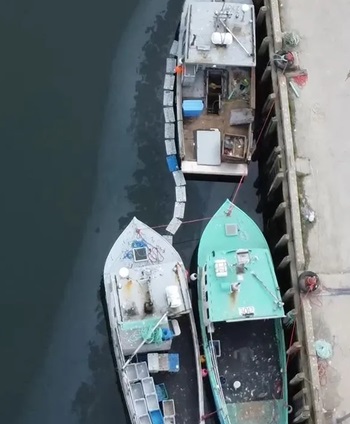 A fishing organization is concerned that a recent oil spill near the government wharf in Saulnierville, N.S., could make people sick and have disastrous implications for the province’s seafood industry if it’s not addressed as soon as possible. The Unified Fisheries Conservation Alliance released video on Thursday of fishing vessels along the wharf surrounded by oil. Tied to some of those boats are crates of lobster floating in the water. “When we saw it we were pretty shocked,” Colin Sproul, the alliance president said in an interview. “We’re really concerned that oil-soaked lobster is going to make it into the marketplace and make people sick.” Officials with the federal government have not yet responded to requests for comment. more, >>CLICK TO READ<< 08:44
A fishing organization is concerned that a recent oil spill near the government wharf in Saulnierville, N.S., could make people sick and have disastrous implications for the province’s seafood industry if it’s not addressed as soon as possible. The Unified Fisheries Conservation Alliance released video on Thursday of fishing vessels along the wharf surrounded by oil. Tied to some of those boats are crates of lobster floating in the water. “When we saw it we were pretty shocked,” Colin Sproul, the alliance president said in an interview. “We’re really concerned that oil-soaked lobster is going to make it into the marketplace and make people sick.” Officials with the federal government have not yet responded to requests for comment. more, >>CLICK TO READ<< 08:44
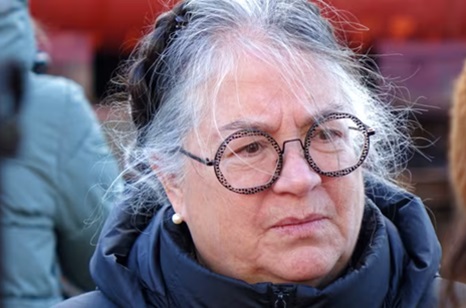
Federal Fisheries minister ignored DFO advice by reopening commercial cod fishery
Federal Fisheries Minister Diane Lebouthillier ignored the advice of staff within her department when she reopened the commercial cod fishery off Newfoundland and Labrador last June. A briefing note dated May 9 reveals that Fisheries and Oceans Canada recommended maintaining the long-time moratorium on northern cod based on scientific evidence, but that political advisors within the minister’s office argued reopening the commercial fishery and hiking quotas would be “politically a victory.” Senior policy advisor Paul Carrigan wrote that DFO staff were concerned about an increase to quotas and the return of offshore boats in the fishery, which would “increase the stocks’ risk of decline.” more, >>CLICK TO READ<< 06:47
DFO defends cut to herring quota that company claims forced N.B. layoffs
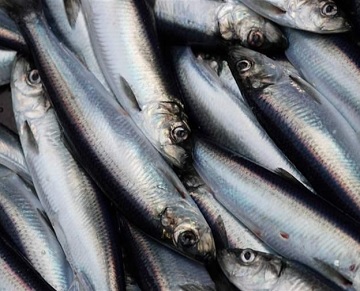 Fisheries and Oceans Canada is defending its July decision to reduce the herring quota in the Bay of Fundy, after a major New Brunswick employer blamed the decision for major layoffs. “We recognize the economic impacts this decision will have on the families and communities that rely on income from fishing and processing herring,” said Lauren Sankey, DFO spokesperson, in an emailed statement late Friday afternoon. Connors Bros., a herring processing company in Blacks Harbour, near St. George, announced this week it’s laying off 20 per cent of its workforce, which is estimated to be about 100 people. more, >>CLICK TO READ<< 07:22
Fisheries and Oceans Canada is defending its July decision to reduce the herring quota in the Bay of Fundy, after a major New Brunswick employer blamed the decision for major layoffs. “We recognize the economic impacts this decision will have on the families and communities that rely on income from fishing and processing herring,” said Lauren Sankey, DFO spokesperson, in an emailed statement late Friday afternoon. Connors Bros., a herring processing company in Blacks Harbour, near St. George, announced this week it’s laying off 20 per cent of its workforce, which is estimated to be about 100 people. more, >>CLICK TO READ<< 07:22
DFO: Some fishery officers refusing work in N.S., citing dangerous conditions
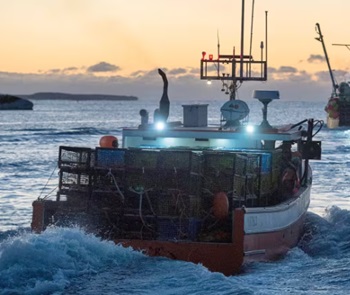 Some fishery officers with Fisheries and Oceans Canada are refusing work in Nova Scotia out of concern for their safety, the federal department said Thursday. While DFO said in a statement it is “making every effort to minimize operational impacts,” a group representing fishermen in southwest Nova Scotia said enforcement officers are nowhere to be seen to prevent illegal fishing during the off-season. “There’s illegal fishing occurring and there is no enforcement staff on the road or on the water or on the wharfs. And it’s out of hand,” Dan Fleck, executive director of the Brazil Rock Lobster Association, more, >>CLICK TO READ<< 20:33
Some fishery officers with Fisheries and Oceans Canada are refusing work in Nova Scotia out of concern for their safety, the federal department said Thursday. While DFO said in a statement it is “making every effort to minimize operational impacts,” a group representing fishermen in southwest Nova Scotia said enforcement officers are nowhere to be seen to prevent illegal fishing during the off-season. “There’s illegal fishing occurring and there is no enforcement staff on the road or on the water or on the wharfs. And it’s out of hand,” Dan Fleck, executive director of the Brazil Rock Lobster Association, more, >>CLICK TO READ<< 20:33
As Europe reviews its rules on seal products, Canada calls for easing of restrictions
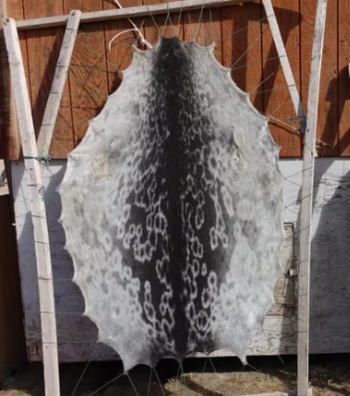 The Canadian government is calling on the European Union to ease restrictions on seal products as member states review trade regulations. Ottawa said in a letter dated Tuesday to the European Commission’s vice-president that Canada has been given the opportunity to “provide input” on the seal trade while the union fine tunes its rules. The outcome is scheduled to be published on the site in eight weeks. In 2009, the European Union limited imports for Canadian seal products, citing the “pain, distress, fear and other forms of suffering” of seals because of the way in which they are killed and skinned. Canada has many species of seals including bearded, grey, harbour, harp, hooded and ringed. Three of these — grey, harp, and hooded — are killed for commercial uses. more, >>CLICK TO READ<< 10:44
The Canadian government is calling on the European Union to ease restrictions on seal products as member states review trade regulations. Ottawa said in a letter dated Tuesday to the European Commission’s vice-president that Canada has been given the opportunity to “provide input” on the seal trade while the union fine tunes its rules. The outcome is scheduled to be published on the site in eight weeks. In 2009, the European Union limited imports for Canadian seal products, citing the “pain, distress, fear and other forms of suffering” of seals because of the way in which they are killed and skinned. Canada has many species of seals including bearded, grey, harbour, harp, hooded and ringed. Three of these — grey, harp, and hooded — are killed for commercial uses. more, >>CLICK TO READ<< 10:44
Commercial whelk fishery opens in eastern Cape Breton
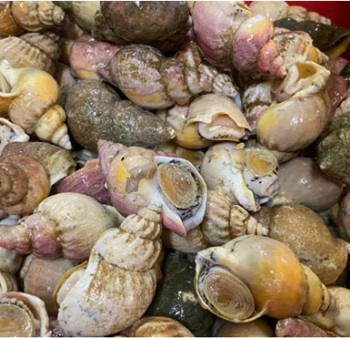 On Tuesday, an event at Louisbourg Seafoods processing plant ushered in the first commercial whelk fishery in waters along the island’s eastern coast. The Louisbourg, N.S., company began experimenting with the harvest of whelk more than a decade ago. “We have a science team and they spend all their time looking at this, and basically developed a clear understanding of what the fishery was out there and how best to manage it,” said Allan MacLean, Louisbourg Seafoods’ senior operations manager. The whelk fishery off eastern Cape Breton, in an area known as the Northwest Atlantic Fisheries Organization Area 4Vs, was previously licensed only for exploratory harvesting to determine if stocks could sustain a commercially viable operation, Fisheries and Oceans Canada said Tuesday in a news release. more, >>CLICK TO READ<< 19:46
On Tuesday, an event at Louisbourg Seafoods processing plant ushered in the first commercial whelk fishery in waters along the island’s eastern coast. The Louisbourg, N.S., company began experimenting with the harvest of whelk more than a decade ago. “We have a science team and they spend all their time looking at this, and basically developed a clear understanding of what the fishery was out there and how best to manage it,” said Allan MacLean, Louisbourg Seafoods’ senior operations manager. The whelk fishery off eastern Cape Breton, in an area known as the Northwest Atlantic Fisheries Organization Area 4Vs, was previously licensed only for exploratory harvesting to determine if stocks could sustain a commercially viable operation, Fisheries and Oceans Canada said Tuesday in a news release. more, >>CLICK TO READ<< 19:46
The Newfoundland cod moratorium is over — but the risk remains
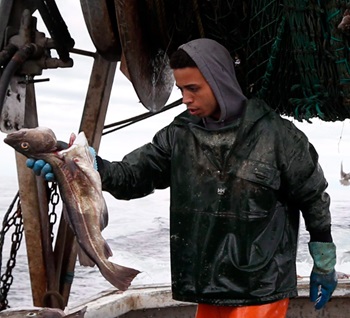 After more than 30 years, the federal government has announced it’s lifting the moratorium that shut down commercial cod fishing in Newfoundland and Labrador in the 1990s. The end of the moratorium includes a 46 per cent increase in total allowable catch from 13,000 tonnes in 2023 to 18,000 tonnes. Just before the collapse in the late 1980s, the total allowable catch was about 240,000 tonnes. Additionally, international offshore fisheries were allocated a quota of 1,000 tonnes, accounting for about five per cent of the total allowable catch. Reactions to the announcement have been mixed. Some organizations, like the Association of Seafood Producers, have voiced their support for the moratorium ending. Others are more skeptical. The union representing inshore fish harvesters, for instance, has asked the government to reverse the decision. more, >>CLICK TO READ<< 09:28
After more than 30 years, the federal government has announced it’s lifting the moratorium that shut down commercial cod fishing in Newfoundland and Labrador in the 1990s. The end of the moratorium includes a 46 per cent increase in total allowable catch from 13,000 tonnes in 2023 to 18,000 tonnes. Just before the collapse in the late 1980s, the total allowable catch was about 240,000 tonnes. Additionally, international offshore fisheries were allocated a quota of 1,000 tonnes, accounting for about five per cent of the total allowable catch. Reactions to the announcement have been mixed. Some organizations, like the Association of Seafood Producers, have voiced their support for the moratorium ending. Others are more skeptical. The union representing inshore fish harvesters, for instance, has asked the government to reverse the decision. more, >>CLICK TO READ<< 09:28
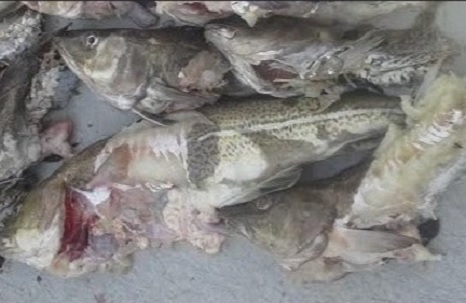
A Very Dire Situation: Downward spiral for Atlantic cod continues in Gulf of St. Lawrence
The latest assessment of Atlantic cod fish stocks in the Gulf of St. Lawrence continues to paint a bleak picture for the future of the species. Fisheries and Oceans Canada issued a warning five years ago saying extinction of the species in the gulf was not just possible, but probable. The first assessment since then has been released. “We are not seeing any recovery of the spawning stock biomass of that stock. It is still experiencing really high levels of natural mortality, especially at the adult stage of life,” said federal Fisheries and Oceans biologist Daniel Ricard. Between 60 and 70 per cent of cod in the southern gulf do not survive beyond age five and are likely being eaten by the huge herds of grey seals in the region, Ricard said. more, >>CLICK TO READ<< 11:17
A Historic Agreement – Canada and U.S. suspend all fishing for Canadian-origin Yukon River chinook salmon
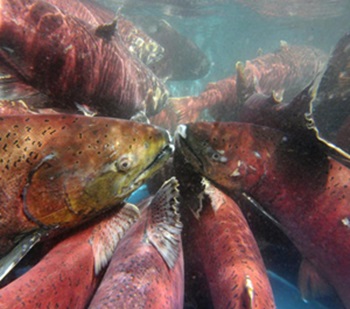 Canada and the United States are suspending all fishing for Canadian-origin Yukon River chinook salmon for seven years in an attempt to protect the dwindling species. The agreement covers the length of one life cycle of the fish and recognizes that the “persistent decline of chinook salmon” has led to an inability to meet conservation objectives in both countries. more, >>CLICK TO READ<< – Canada and Alaska sign a historic agreement to protect Yukon River Chinook salmon, To ensure the protection and recovery of Yukon River Chinook salmon, Fisheries and Oceans Canada and the Alaska Department of Fish and Game have signed a historic seven-year agreement. more, >>Click to read<< 10:33
Canada and the United States are suspending all fishing for Canadian-origin Yukon River chinook salmon for seven years in an attempt to protect the dwindling species. The agreement covers the length of one life cycle of the fish and recognizes that the “persistent decline of chinook salmon” has led to an inability to meet conservation objectives in both countries. more, >>CLICK TO READ<< – Canada and Alaska sign a historic agreement to protect Yukon River Chinook salmon, To ensure the protection and recovery of Yukon River Chinook salmon, Fisheries and Oceans Canada and the Alaska Department of Fish and Game have signed a historic seven-year agreement. more, >>Click to read<< 10:33
Canada, Alaska suspend fishing of Yukon River chinook salmon for 7 years
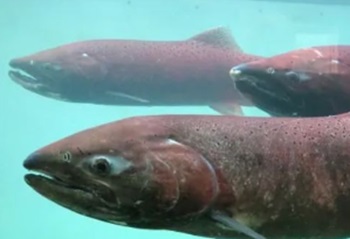 In a bid to help the recovery of the Yukon River chinook salmon run, the federal government and the State of Alaska have agreed to implement a seven-year moratorium on fishing the species. The suspension, in effect for one full life cycle of a salmon, includes commercial fishing and recreational angling in the Yukon River mainstem and its Canadian tributaries. Representatives from Fisheries and Oceans Canada and the Alaska Department of Fish and Game signed the agreement on Monday. The number of chinook salmon crossing the international border into Canadian waters has for years plummeted, with the last two years yielding some of the worst tallies recorded on the Yukon River. more, >>click to read<< 09:06
In a bid to help the recovery of the Yukon River chinook salmon run, the federal government and the State of Alaska have agreed to implement a seven-year moratorium on fishing the species. The suspension, in effect for one full life cycle of a salmon, includes commercial fishing and recreational angling in the Yukon River mainstem and its Canadian tributaries. Representatives from Fisheries and Oceans Canada and the Alaska Department of Fish and Game signed the agreement on Monday. The number of chinook salmon crossing the international border into Canadian waters has for years plummeted, with the last two years yielding some of the worst tallies recorded on the Yukon River. more, >>click to read<< 09:06
Maritime elver fishery closure penalizes legal fishers, committee hears
 The committee heard from the Canada Border Services Agency, the Canadian Food Inspection Agency, the RCMP, the Canadian Committee for a Sustainable Eel Fishery, and a legal elver fisherman with Shelburne Elver. “I lost my partner to cancer a few months ago,” Zachary Townsend, the elver fisherman, told the committee. “It’s been hard and unbearable at times. But to now be unemployed and facing an uncertain financial future is simply a challenge I didn’t need. “And I don’t share such sad news to vote your pity, but instead to remind you that each of us 1,100 [Maritime elver fishers] has a story and a unique set of circumstances now made worse by the minister.” The elver fishing season was cancelled in Nova Scotia and New Brunswick after Fisheries and Oceans Canada admitted it couldn’t control poaching or the export of baby eels, which sell for thousands of dollars a kilogram. more. >>click to read<< 16:42
The committee heard from the Canada Border Services Agency, the Canadian Food Inspection Agency, the RCMP, the Canadian Committee for a Sustainable Eel Fishery, and a legal elver fisherman with Shelburne Elver. “I lost my partner to cancer a few months ago,” Zachary Townsend, the elver fisherman, told the committee. “It’s been hard and unbearable at times. But to now be unemployed and facing an uncertain financial future is simply a challenge I didn’t need. “And I don’t share such sad news to vote your pity, but instead to remind you that each of us 1,100 [Maritime elver fishers] has a story and a unique set of circumstances now made worse by the minister.” The elver fishing season was cancelled in Nova Scotia and New Brunswick after Fisheries and Oceans Canada admitted it couldn’t control poaching or the export of baby eels, which sell for thousands of dollars a kilogram. more. >>click to read<< 16:42
Snow crab stock projected to remain healthy, for the most part, in 2024
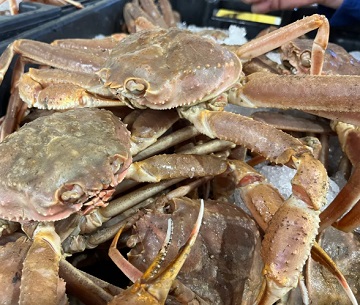 Fisheries and Oceans Canada released its annual stock assessment on snow crab Tuesday in St. John’s, and the data indicates the stock remains on par with last year with no major changes. That means the stock is projected to remain healthy for the majority of fishing areas around the province, with one exception. The 2HJ zone off the east coast of Labrador remains in the cautious zone, similar to last year’s assessment. But the positive news may be a result of an ocean cooling period that happened between 2012 and 2018. Snow crab flourish in colder water, allowing young crab the ability to grow to exploitable age and size. That’s between nine and 13 years old with a shell size of over 94 mm for males. Female crab cannot be retained by harvesters. more, >>click to read<< 15:06
Fisheries and Oceans Canada released its annual stock assessment on snow crab Tuesday in St. John’s, and the data indicates the stock remains on par with last year with no major changes. That means the stock is projected to remain healthy for the majority of fishing areas around the province, with one exception. The 2HJ zone off the east coast of Labrador remains in the cautious zone, similar to last year’s assessment. But the positive news may be a result of an ocean cooling period that happened between 2012 and 2018. Snow crab flourish in colder water, allowing young crab the ability to grow to exploitable age and size. That’s between nine and 13 years old with a shell size of over 94 mm for males. Female crab cannot be retained by harvesters. more, >>click to read<< 15:06
‘It’s definitely precedent setting:’ commercial prawn operator fined $250K
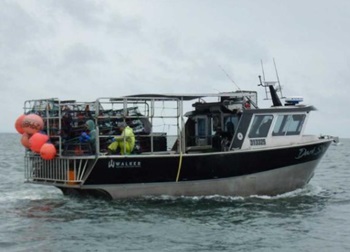 Prawning in an environmentally sensitive area off the lower Sunshine Coast resulted in a heavy fine and fishing gear seizure against a Delta man. A recent provincial court sentencing hearing in Sechelt followed the conviction of 13 violations under Canada’s Fisheries Act against Dean Keitsch in connection to incidents in July 2020 off the coastal community on board his vessel Dark Star. Fisheries officers retrieved more than 550 prawn traps set at the bottom of the Strait of Georgia Glass Sponge Reef Marine Refuge, which is closed to all forms of bottom fishing. photos, more, >>click to read<< 07:05
Prawning in an environmentally sensitive area off the lower Sunshine Coast resulted in a heavy fine and fishing gear seizure against a Delta man. A recent provincial court sentencing hearing in Sechelt followed the conviction of 13 violations under Canada’s Fisheries Act against Dean Keitsch in connection to incidents in July 2020 off the coastal community on board his vessel Dark Star. Fisheries officers retrieved more than 550 prawn traps set at the bottom of the Strait of Georgia Glass Sponge Reef Marine Refuge, which is closed to all forms of bottom fishing. photos, more, >>click to read<< 07:05
Wolastoqey fishers say proposed elver fishery shutdown infringes on treaty rights
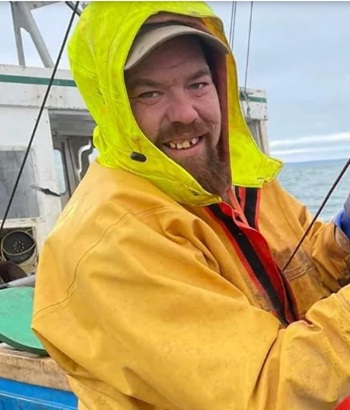 Some Wolastoqey fishers say closure of the fishery for baby eels, or elvers, this year will infringe on their treaty rights and impact their right to earn a moderate livelihood from fishing. Last week, Fisheries and Oceans Canada (DFO) issued letters to commercial licence holders that it will not renew licences ahead of the elver season that typically starts in late March. DFO shut down the elver fishery in New Brunswick and Nova Scotia last April because of conservation and safety concerns, after reports of violence and overfishing by unauthorized harvesters. Tyler Sabattis, a lobster and scallop fisherman, said he got into elver fishing last year to earn extra income for his family and community in Bilijk (Kingsclear First Nation), near Fredericton. more, >>click to read<< 09:34
Some Wolastoqey fishers say closure of the fishery for baby eels, or elvers, this year will infringe on their treaty rights and impact their right to earn a moderate livelihood from fishing. Last week, Fisheries and Oceans Canada (DFO) issued letters to commercial licence holders that it will not renew licences ahead of the elver season that typically starts in late March. DFO shut down the elver fishery in New Brunswick and Nova Scotia last April because of conservation and safety concerns, after reports of violence and overfishing by unauthorized harvesters. Tyler Sabattis, a lobster and scallop fisherman, said he got into elver fishing last year to earn extra income for his family and community in Bilijk (Kingsclear First Nation), near Fredericton. more, >>click to read<< 09:34
Swordfish are moving north in Canadian waters
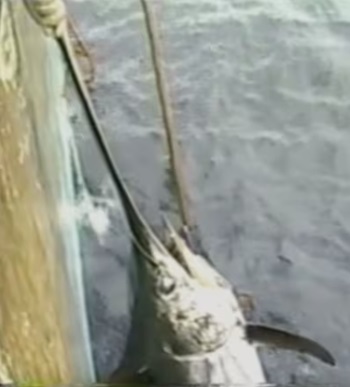 “It’s still unclear whether this is becoming the new normal due to climate change or if the biomass will eventually shift back again as we think it did historically,” said Fisheries and Oceans Canada biologist Kyle Gillespie. Nineteen-hundred tonnes of swordfish were landed in Canada last year. Nearly a third of the swordfish were taken off Newfoundland, where longline fishing boats from Nova Scotia trailed kilometres of baited hooks throughout much of the summer. Gillespie said this is a rapid shift from the previous decade, when the entire Canadian catch was concentrated along the Scotian Shelf and Georges Bank off southern Nova Scotia. more, >>click to read<< 08:46
“It’s still unclear whether this is becoming the new normal due to climate change or if the biomass will eventually shift back again as we think it did historically,” said Fisheries and Oceans Canada biologist Kyle Gillespie. Nineteen-hundred tonnes of swordfish were landed in Canada last year. Nearly a third of the swordfish were taken off Newfoundland, where longline fishing boats from Nova Scotia trailed kilometres of baited hooks throughout much of the summer. Gillespie said this is a rapid shift from the previous decade, when the entire Canadian catch was concentrated along the Scotian Shelf and Georges Bank off southern Nova Scotia. more, >>click to read<< 08:46
2023 was another bad year for chinook, fall chum salmon, Yukon River Panel hears
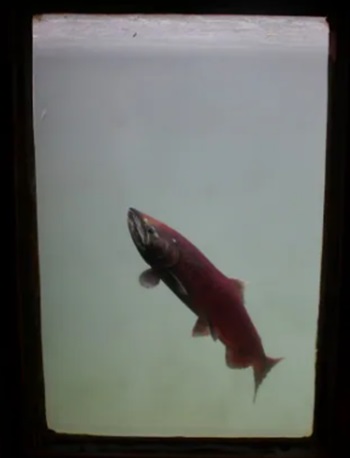 Alaska and Yukon representatives met in Whitehorse last week to discuss the 2023 chinook and fall chum salmon runs on the Yukon River, which once again failed to meet Canadian conservation goals. An estimated 58,529 chinook salmn entered the river last year, according to public presentations by the Alaska Department of Fish and Game, and Fisheries and Oceans Canada (DFO) during the Yukon River Panel’s post-season meeting. It was the second-smallest run on record — 2022 was the smallest — and not enough to meet spawning escapement goals on either side of the border. The goals set out the minimum range of fish that need to make it to their spawning areas to healthily sustain the population. more, >>click to read<< 13:51
Alaska and Yukon representatives met in Whitehorse last week to discuss the 2023 chinook and fall chum salmon runs on the Yukon River, which once again failed to meet Canadian conservation goals. An estimated 58,529 chinook salmn entered the river last year, according to public presentations by the Alaska Department of Fish and Game, and Fisheries and Oceans Canada (DFO) during the Yukon River Panel’s post-season meeting. It was the second-smallest run on record — 2022 was the smallest — and not enough to meet spawning escapement goals on either side of the border. The goals set out the minimum range of fish that need to make it to their spawning areas to healthily sustain the population. more, >>click to read<< 13:51
Canada plans crackdown as trade data shows elver exports were 4 times the legal catch in 2022
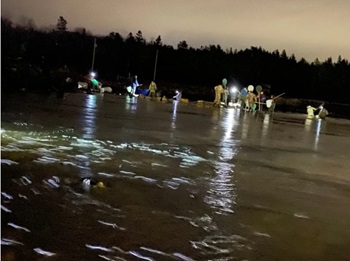 Fisheries and Oceans Canada (DFO) plans to crack down on the illegal fishery for baby eels, also known as elvers, in the Maritimes next year by creating separate possession-and-export licences to track the catch from river to airport. The effort comes as newly reported trade data shows a huge surge in elver exports leaving Canada, reaching an all time high of 43 tonnes in 2022 — four times the authorized Canadian total allowable catch. To avoid a repeat of the chaos and deter the illegal trade, DFO wants new regulations in place by March 2024, ahead of the spring elver migration and fishing season. photos, more, >>click to read<< 14:32
Fisheries and Oceans Canada (DFO) plans to crack down on the illegal fishery for baby eels, also known as elvers, in the Maritimes next year by creating separate possession-and-export licences to track the catch from river to airport. The effort comes as newly reported trade data shows a huge surge in elver exports leaving Canada, reaching an all time high of 43 tonnes in 2022 — four times the authorized Canadian total allowable catch. To avoid a repeat of the chaos and deter the illegal trade, DFO wants new regulations in place by March 2024, ahead of the spring elver migration and fishing season. photos, more, >>click to read<< 14:32
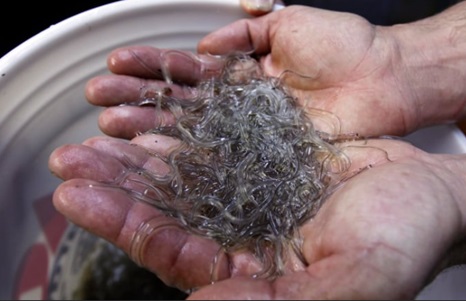
Tonnes of elvers were poached in 2023, but border agents didn’t find any
The disclosure came from Daniel Anson, the agency’s director of general intelligence and investigations, during a recent appearance before the standing Fisheries and Oceans Canada parliamentary committee examining illegal, unreported and unregulated fishing. “We have not had any seizures of elver eels this specific year. We have effected a variety of different examinations to ensure compliance and have not found anything that was illicit or destined abroad that had been harvested illegally or the result of unreported fishing,” Anson testified last week. That was greeted with scorn by one Nova Scotia MP. Elvers are Canada’s most valuable seafood species by weight, fetching up to $5,000 per kilogram. more, >>click to read<< 11:53
Newfoundland fishermen get ‘best news’ on northern cod stocks in a generation
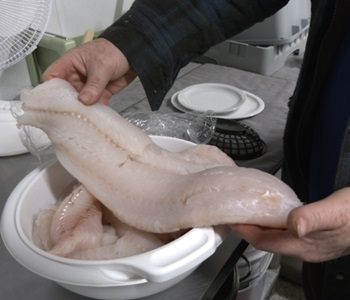 It’s a technical, scientific change: the Limit Reference Point, a key part of the assessment of a fish stock’s health, has been revised. Because of a change in their scientific method, officials at Fisheries and Oceans Canada now believe that Newfoundland’s northern cod stock has moved out of the critical zone for the first time in decades. When then-fisheries minister John Crosbie shut down most of the fishery in 1992, about 30,000 fish harvesters instantly lost their jobs. It was the biggest layoff in Canadian history. Fish harvesters were given $225 a week for 10 weeks to get by. The moratorium was only expected to last two years, but in the decades since, the northern cod stock never left the critical zone — until now. photos, >>click to read<< 07:44
It’s a technical, scientific change: the Limit Reference Point, a key part of the assessment of a fish stock’s health, has been revised. Because of a change in their scientific method, officials at Fisheries and Oceans Canada now believe that Newfoundland’s northern cod stock has moved out of the critical zone for the first time in decades. When then-fisheries minister John Crosbie shut down most of the fishery in 1992, about 30,000 fish harvesters instantly lost their jobs. It was the biggest layoff in Canadian history. Fish harvesters were given $225 a week for 10 weeks to get by. The moratorium was only expected to last two years, but in the decades since, the northern cod stock never left the critical zone — until now. photos, >>click to read<< 07:44
Shrimp fishing: gloomy outlook and angry fishermen
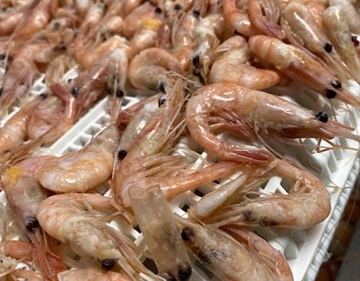 The state of northern shrimp stocks in the estuary and Gulf of St. Lawrence will not improve in the short and medium term and could even continue to deteriorate. It is this grim observation that Fisheries and Oceans Canada shared with the fishermen and processors gathered Tuesday in Quebec for the first day of the shrimp advisory committee of the Estuary and Gulf of Saint -Laurent. DFO biologists have clearly identified redfish predation as one of the main causes of the decline of shrimp stocks in the four fishing areas of the Estuary and Gulf. The warming of the water in the Gulf and the significant drop in oxygen levels also explain the drastic fall in northern shrimp stocks.>>click to read<<14:12
The state of northern shrimp stocks in the estuary and Gulf of St. Lawrence will not improve in the short and medium term and could even continue to deteriorate. It is this grim observation that Fisheries and Oceans Canada shared with the fishermen and processors gathered Tuesday in Quebec for the first day of the shrimp advisory committee of the Estuary and Gulf of Saint -Laurent. DFO biologists have clearly identified redfish predation as one of the main causes of the decline of shrimp stocks in the four fishing areas of the Estuary and Gulf. The warming of the water in the Gulf and the significant drop in oxygen levels also explain the drastic fall in northern shrimp stocks.>>click to read<<14:12
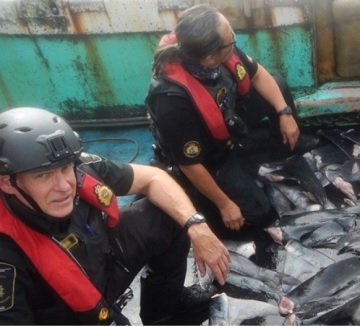
DFO says thousands of illegal shark fins found during Pacific patrol
Canadian fisheries officers discovered more than 3,000 shark fins while conducting a maritime surveillance and enforcement mission in the North Pacific Ocean, according to Fisheries and Oceans Canada. The agency says the fins were illegally possessed or stored on multiple vessels that were inspected during a two-month patrol of the high seas between British Columbia and Japan. Some of the fins were from threatened species, including the oceanic whitetip shark, the DFO said in news 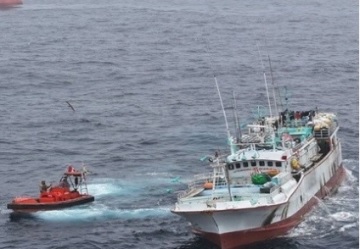 release Thursday. The annual enforcement mission, known as Operation North Pacific Guard, included fishery and coast guard officers from the United States and Japan, as well as a Canadian patrol aircraft temporarily based out of Japan. >>click to read << 16:21
release Thursday. The annual enforcement mission, known as Operation North Pacific Guard, included fishery and coast guard officers from the United States and Japan, as well as a Canadian patrol aircraft temporarily based out of Japan. >>click to read << 16:21
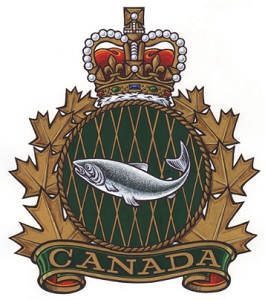
Statement from Fisheries and Oceans Canada regarding lobster fishing in St. Marys Bay, Nova Scotia
Fisheries and Oceans Canada (DFO) is committed to a renewed relationship with Indigenous peoples based on recognizing rights, respect, collaboration, and partnership. As part of that commitment, we are working with First Nations harvesters so that they can exercise their Supreme Court-affirmed Treaty right to fish through various DFO-authorized fisheries. These fisheries include food, social and ceremonial (FSC), and communal commercial fisheries, including interim understandings reached to fish in pursuit of a moderate livelihood. >>click to read<< 10:14

Scientists Level New Critiques of Fisheries and Oceans Canada’s Scientific Rigor
Twenty-five years ago, after the collapse of the Atlantic cod fishery, Jeffrey Hutchings, a preeminent fisheries scientist and professor at Dalhousie University in Nova Scotia, sounded the alarm that Canada’s federal fisheries department was allowing “nonscience influences” in critical decision-making. Writing at the time, he said, “There is a clear and immediate need for Canadians to examine very seriously the role of bureaucrats and politicians in the management of Canada’s natural resources.” Today, a new crop of researchers is once again imploring Fisheries and Oceans Canada (DFO) to change its ways. At the core of their concerns is a number of systemic and structural ways in which DFO gathers, parses, and handles scientific information, and how that advice is passed on to decision-makers. >click to read< 09:20
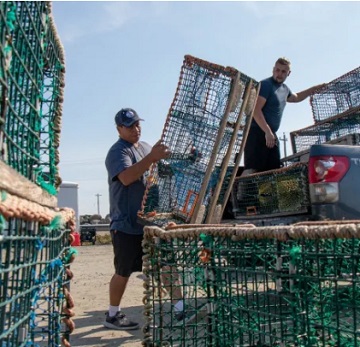
DFO says it has enough resources to monitor Indigenous lobster fishing in Nova Scotia
Fisheries and Oceans Canada (DFO) says its enforcement branch will be on the water and adequately equipped to monitor compliance of First Nations lobster fisheries this summer. The pledge follows the chaotic fishery for baby eels this spring where there was widespread illegal activity by some Indigenous and non-Indigenous harvesters. DFO shut down the legal elver fishery, affecting both commercial licence holders and Indigenous groups with fishing plans approved by the department. But “poaching”, as federal Fisheries Minister Joyce Murray called it, continued. “I want to clarify they are two very different fisheries,” Maritimes region director of conservation and protection Tim Kerr told reporters Monday in a briefing on Indigenous rights-based lobster fisheries. >click to read< 08:35
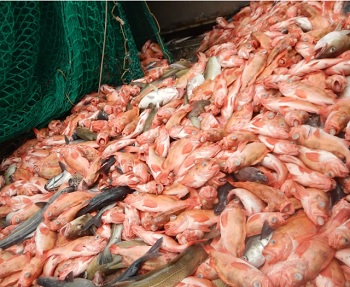
Canada: Positioning for redfish re-opening
Canada’s commercial fishery for redfish in the Gulf of St. Lawrence has remaind closed since 1995 to allow redfish stocks rebuild to healthy levels. Now the authorities are positioning to re-open the Unit 1 redfish commercial fishery in Atlantic Canada and Quebec in the near future. The announcement has been made by Minister of Fisheries Joyce Murray that in preparation for a pending commercial fishery, the 2023 experimental fishery for Unit 1 redfish will be increased from 2500 to 5000 tonnes. Twenty-four individuals and groups from Quebec, New Brunswick, Prince Edward Island, Nova Scotia and Newfoundland and Labrador have been approved to participate, five of which are Indigenous groups. >click to read< 07:48
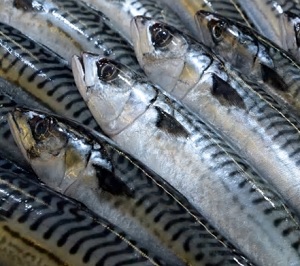
Atlantic mackerel moratorium extended for 2023 season
Fisheries and Oceans Canada has extended the closure of Atlantic mackerel commercial and bait fishing in Atlantic Canada and Quebec for the 2023 season. In a notice to fish harvesters on Wednesday, the federal department said it was continuing the moratorium “to allow the stock to rebuild.” The moratorium has been in place since March 2022. In its notice, Fisheries and Oceans Canada said results of a Canadian stock assessment found Atlantic mackerel “declined further in the critical zone since the last assessment, with spawning stock biomass at its lowest-observed value.” The critical zone means serious harm is occurring. >click to read< 18:36






